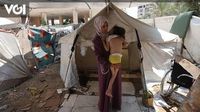In the besieged Gaza Strip, the humanitarian catastrophe grows more dire by the day. The latest figures from Gaza’s Health Ministry, reported by multiple outlets including ANTARA and al24news, confirm that five more Palestinians—including a child—have died of starvation and severe malnutrition in just the last 24 hours. This brings the famine-related death toll since October 2023 to 404, with children accounting for 141 of those lives lost.
The grim statistics don’t end there. According to the Health Ministry, 126 of these deaths—including 26 children—have occurred since August 2025, after the UN-backed Integrated Food Security Phase Classification (IPC) formally declared Gaza a famine zone. The IPC, which classifies food insecurity on a scale from Phase 1 (minimal) to Phase 5 (catastrophe/famine), has placed Gaza in the most extreme category. The United Nations World Food Program (WFP) confirmed on August 22 that the hunger crisis in Gaza is the most severe since the conflict erupted in 2023. By the end of September, more than 640,000 people across the Palestinian territories are expected to face Phase 5 food vulnerability, according to the UN.
For families in Gaza, the choices are harrowing: risk permanent displacement with little hope of return, or stay and face death, serious injury, illness, and starvation. “What we are seeing in Gaza City is not just a crisis, it is a collapse of human survival,” said Natalia Anguera, Head of Operations for the Middle East at Action Against Hunger. She described families as “hungry, exhausted, grieving, and can’t imagine having to move their children—some for the twenty-sixth time in less than two years.”
The conditions for children and vulnerable groups are especially dire. Local authorities report that 43,000 toddlers and more than 55,000 pregnant and lactating women are currently suffering from malnutrition. Action Against Hunger, which has established over six community-based management points for acute malnutrition across Gaza City, treated more than 400 cases of malnourished children in July and August alone—20% of whom were classified as severe. The group has also set up three Mother and Baby Friendly Spaces, but ongoing bombardments, ground operations, and displacement orders threaten to interrupt these vital services. “Despite our teams’ relentless efforts, they too are facing this same collapse,” Anguera added.
The humanitarian crisis has been exacerbated by Israel’s decision, as reported by ANTARA and al24news, to seal all border crossings since March 2, 2025, effectively cutting off Gaza’s 2.4 million residents from food and humanitarian aid. The closure came after the Israeli army resumed attacks on March 18, shattering a brief ceasefire and prisoner exchange agreement. Since then, 12,098 people have been killed and 51,462 injured, according to the Health Ministry. The total death toll since the war began in October 2023 now stands at a staggering 64,656 Palestinians, with more than 163,503 injured.
Access to basic necessities is increasingly out of reach. In Gaza City, water availability has plummeted by 70% due to fuel shortages and infrastructure damage, forcing families to rely on water trucking—a stopgap measure at best. Many lack the means to collect or store the limited water delivered, and truck access is frequently disrupted by ongoing military activity. Without restoring Gaza’s water and sanitation infrastructure, communities remain at serious risk of both starvation and disease. Essential activities such as water trucking and the rehabilitation of sanitation infrastructure are under constant threat from bombardments and displacement orders. “It is hard to imagine nearly one million people coming back to the South. There is no shelter anymore. There are no tents, no tarps. People are making shelters out of nothing,” said an Action Against Hunger staff member in Gaza.
Compounding the crisis, Israel has refused to cooperate with the United Nations Agency for Palestinian Refugees (UNRWA), which for decades has been responsible for aid supplies to Palestine. Hundreds of UNRWA aid distribution centers have been shuttered, replaced by just four distribution centers managed by the US and Israeli-backed Gaza Humanitarian Funds, according to local authorities. Gaza officials have also revealed that Israeli forces have frequently opened fire on Palestinians lining up for humanitarian assistance. Since May 27, the Health Ministry reports, 2,456 Palestinians have been killed and over 17,861 wounded while seeking aid, with 12 killed and more than 30 injured in just the last 24 hours.
The scale of displacement is staggering. At least 86% of the Gaza Strip is now under displacement orders or in militarized zones, according to Action Against Hunger. Damaged infrastructure and overcrowding in both affected and unaffected areas make access to water, food, shelter, and healthcare an ongoing struggle. Humanitarian organizations like Action Against Hunger warn that their operations cannot become a means of forcible transfer—a practice that constitutes a grave violation of international law. “Forcible transfer constitutes a grave violation of international law. We urge all parties to the conflict to respect international humanitarian law and ensure safe access for humanitarian personnel and supplies,” said Anguera.
The international legal ramifications continue to mount. In November 2024, the International Criminal Court (ICC) issued arrest warrants for Israeli Prime Minister Benjamin Netanyahu and former Defense Minister Yoav Gallant, citing war crimes and crimes against humanity in Gaza. Israel also faces a genocide case at the International Court of Justice for its ongoing war on the enclave.
Humanitarian organizations are calling for urgent action. Action Against Hunger reiterates its demand for a permanent ceasefire, the unconditional release of all hostages and detainees, and full, large-scale, and sustained access for humanitarian actors. “At Action Against Hunger we reaffirm once again our commitment to serve people wherever they are, and we will, for as long as we can, remain present in Gaza City to provide lifesaving support,” Anguera stated.
As the blockade and military campaign continue, the people of Gaza are left to endure relentless bombardment, displacement, and deprivation. The world watches as one of the worst humanitarian crises in recent memory unfolds, with no immediate end in sight. For the families who remain, the daily struggle for survival is a stark reminder of the urgent need for international intervention and lasting peace.


